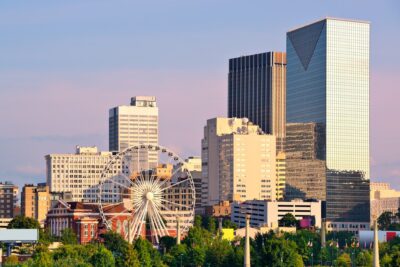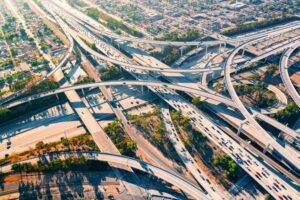
Atlanta traffic is a full-blown headache for everyone who must drive in, around, or through the city. Much time and money are wasted because of the traffic patterns and roads that were not planned for the amount of traffic they would have to support. Bottlenecks are one of the larger problems in Atlanta, and many unfortunate travelers are faced with them daily.
Atlanta Recognized for Traffic Problems
The INRIX 2022 Global Traffic Scorecard reviewed traffic information from 7 continents, 50 countries, and over a thousand cities. After deep diving into traffic around the globe, Atlanta ranked 28th behind cities like London, Chicago, and New York City. This information comes as no surprise to Atlanta residents.
The American Transportation Research Institute (ATRI) has gathered and analyzed truck GPS data through U.S. DOT freight mobility initiatives. The database provided freight truck GPS data that was then used to monitor and analyze bottlenecks. Measuring freight movement around US highways informs the decisions made by the public and private sectors.
Out of the entire country, Atlanta occupies eight spots in the Top 100 Truck Bottlenecks of 2023. Unsurprisingly to anyone traveling these roads, Atlanta claimed six spots in the top twenty, two of which were in the top five. The only state with a worse rating is Texas.
Get the strong arm
Traffic Problems in Atlanta
The problems that bottlenecks cause can be compounded by other problems on the road. Some of these problems include the following:
- Automobile accidents that block lanes
- Weather conditions such as icy roads and poor visibility, among other things
- Unexpected spikes in traffic
- Traffic control equipment such as stoplights malfunctioning or disabled
Sometimes several factors contribute to traffic issues. For instance, when the weather report calls for ice and snow and schools and businesses close early, this generates a spike in traffic.
The ice may cause slippery conditions, which cause accidents that block traffic lanes. Paired with bottlenecks, this can cause a nightmarish and unsafe scenario for those traveling in particular areas.
The Top 9 Troublespots for Atlanta Bottlenecks
These nine spots are among the top 100 in the national ranking by the congestion index by ARTI. Atlanta commuters lose money and time at these spots daily.
- Taking the fourth spot nationally is I-285 at I-85 (North)
- I-20 at I-285 (West) sits in the national congestion
- I-20 at I-285 (East)
- I-75 at I-285
- I-285 at SR 400
- I-75 at I-285 (North)
- I-75 at I-675
- I-75 at I-85
- McDonough: I-75
How Much Traffic Congestion Costs Atlanta Drivers
Sitting in traffic is no one’s idea of time well spent. Yet, every day, without fail, those commuting around the Atlanta area are faced with wasted time due to congestion from bottlenecks in areas such as the accurately named Spaghetti Junction area of Atlanta. The city is ranked 28th worldwide for the most congested city and the tenth most congested city in the United States.
Annually, Atlanta motorists lose an average of 74 hours in traffic – that’s a little more than three days. Three days of their one and only precious life were spent idling in Atlanta traffic should never happen. These hours are stolen from the citizens of Atlanta and the surrounding area.
We can only imagine what could be done with that time if it were well-spent rather than sitting in traffic. But, more concretely, we can imagine what could be done with the money wasted on fuel during the year. The annual cost of congestion per driver is $1257. That time and money truly add up.
How Traffic Issues Impact Us
Commuting delays are a headache, but traffic creates other problems as well. Traffic difficulties compound so many issues. Supply chain problems occur when delivery drivers cannot deliver what they need. These delays cause the delivery of food and essentials to be slowed as well.
Essentials and nonessentials not being promptly delivered cause problems for businesses. It is challenging to provide dependable goods and services when traffic patterns make it impossible to predict how long deliveries will take.
High-congestion areas are not desirable areas to begin a new business. Naturally, it even discourages potential residents from moving to the area. Ceaseless traffic is undesirable and can play a detrimental role in how communities operate.
Investment in Public Transportation Could Help
The United States Public Interest Research Group (USPIRG) performed a 2022 study that emphasized increasing investment in the country’s public transportation offerings. Public transit could help with many of the following issues:
- Reducing the consumption of oil
- A reduction in time spent in traffic
- A smaller environmental impact
- Improved quality of life
- Economic advantages for those who do not have to own, maintain, gas up and insure personal vehicles
- Job market growth in the public transportation field would be far more than the amount spent on highway maintenance.
- With internet services offered on buses and trains, commuters could use commuting time to be more productive at their jobs or experience some downtime.
- Reduction of the use of fossil fuels
Transportation technology is projected to become increasingly relevant as there is more demand for better options. All over the world, people need more options. Atlantans are especially tired of sitting in traffic and paying for the privilege of doing so.
Infrastructure Planning Could Provide Alternatives
Many cities with traffic problems, like Atlanta, are looking to infrastructure planners to provide safe alternatives to help with the traffic congestion issues. Some of these cities are investing in their cities by adding some of the following efficient and safe methods of curbing traffic:
- Bicycle lanes
- Carpool lanes
- Bus-only lanes
- Bus tunnels
- Trolleys
- Streetcar tracks
For these alternatives to be more effective, they need to use logical design criteria rather than just adding a lane to the typical monolithic roadways in large cities. Creating these as fully separated streets and specifically exclusive spaces helps to streamline traffic routes.
Transit Design Ideas
Perhaps transit design ideas can be implemented into urban planning around Atlanta. Reducing the traffic bottlenecks that have Atlanta struggling with wasted time and money could make things easier for residents and businesses in the area. Obviously, new development and growth are not attracted to the congested areas of Atlanta, which complicates keeping all areas of the city revitalized.
Mindful urban planning to boost transportation in and around Atlanta could be a game changer for parts of the city struggling to thrive because they are stuck in traffic.
Issues on the Atlanta Roadways
If you have had a traffic accident, another issue, or an offense in Atlanta, contact John Foy & Associates for help. The Atlanta area is filled with obstacles. We understand how to navigate the legal ones.
404-400-4000 or complete a Free Case Evaluation form






